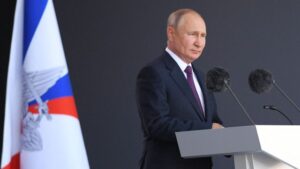In His First Post-war Visit, Blinken Requests Ethiopia To Strengthen The Peace.
 As part of his cautious efforts to mend ties damaged by the horrific two-year battle, US Secretary of State Antony Blinken urged Ethiopia on Wednesday to “deepen the peace” in the country’s war-torn north.
As part of his cautious efforts to mend ties damaged by the horrific two-year battle, US Secretary of State Antony Blinken urged Ethiopia on Wednesday to “deepen the peace” in the country’s war-torn north.
The senior American ambassador was visiting the longtime ally for the first time since the conclusion of the Tigrayan War, which according to US estimates lost 500,000 lives and caused Washington to break trade favors with Africa’s second-most populous country.
Blinken began his tour by expressing optimism for improved ties while sipping Ethiopia’s famed coffee at the foreign ministry. China and Russia are vying for influence more and more in Ethiopia and throughout the continent.
With the calm that has established itself in the north, Blinken said that this is a crucial moment and a time of optimism.
A much has to be done. To strengthen the peace that has already taken root in the north is perhaps the most crucial thing, he said.
While US President Joseph Biden works for tighter ties with African countries, Blinken, who claimed crimes against humanity during the conflict, said his priority was “strengthening the connection” with Ethiopia, the African Union’s home country.
During their private meeting in front of the press, Blinken and Prime Minister Abiy Ahmed “decided to deepen the historic bilateral ties (between) our nations with a commitment to collaboration,” the latter of whom subsequently met with Blinken.
Relationships have soured. Nobel Peace Prize winner Abiy was formerly seen as the head of a new generation of forward-thinking African presidents, but his image has since suffered in Washington due to the conflict.
As the Tigray People’s Liberation Front (TPLF), which long controlled Ethiopian politics, attacked military posts, Abiy’s government launched a major onslaught with support from nearby Eritrea.
The TPLF almost invaded the capital but were pushed back by pro-Abiy troops and decided to disarm as part of an agreement reached on November 2 in South Africa during talks between the African Union and the US.
Returning to the African Growth and Opportunity Act, US legislation that granted it duty-free access to the greatest economy in the world for the majority of its exports, is one of Ethiopia’s top priorities, but Washington has made no assurances in this regard.
While there are limits on media access, Abiy has promised to restore essential services to war-torn Tigray. But, it is hard to judge the reality on the ground.
Even as Tigray experiences a return to some kind of normality, violence has broken out in other parts of the varied nation, including murders in the Oromia region in the center of Ethiopia.
After a disagreement with the influential Orthodox Church, the government has also severely restricted internet access across the nation.
Blinken has been encouraged by Human Rights Watch and Amnesty International to push for the full implementation of the peace agreement and responsibility for earlier wrongdoings.
Kate Hixon, head of Africa advocacy for Amnesty International, said that failure to act would send a message to criminals worldwide that the US would not stand up for justice.
A growing portion of the US Ethiopian diaspora has distanced itself from Abiy but has been harshly critical of the Biden administration, particularly about the removal of trade favors.
The American-Ethiopian Public Affairs Committee issued a statement on Blinken’s visit that said, “The USA cannot advocate for human rights on the one hand and make attempts to preserve and accommodate the worst human rights abusers on the other.
The United States “must stand on the side of the Ethiopian people after the tragic violence in Ethiopia,” it said.
The US estimates that the Tigray war has killed more people than Russia’s invasion of Ukraine, which has received far more attention globally. It is one of the deadliest conflicts of the twenty-first century.
Since then, Russia has launched a diplomatic assault across Africa, especially Ethiopia, in the hopes that the region would remain neutral and refrain from supporting Western sanctions on it.
China has been making gains into Africa for years, offering the continent’s leaders connections free of Western criticism on human rights. Russia is also stepping up its efforts in the region.



